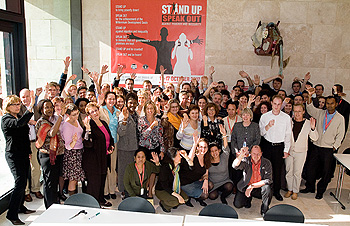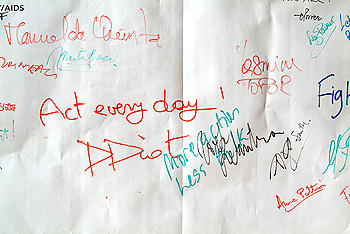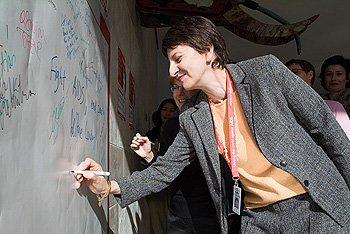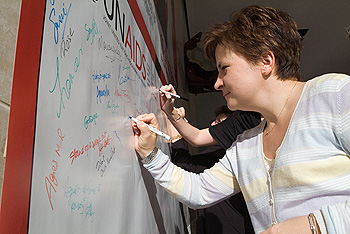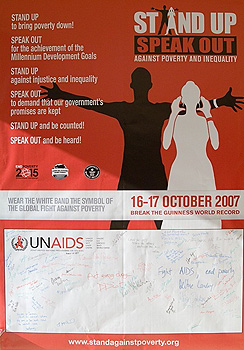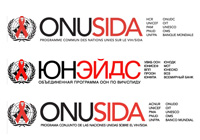
Nouveau site Internet mondial en français, espagnol et russe.
L’ONUSIDA vient de lancer la première phase de la mise en ligne de son site Internet mondial en français, espagnol et russe. Pour la première fois, différentes sections du site sont désormais disponibles dans chacune des 4 langues officielles du Programme commun.
Dans un objectif de transparence, l’ONUSIDA continuera de traduire davantage de contenu. Pour l’heure, lorsque les versions russe, espagnole et française ne sont pas encore disponibles, la langue par défaut reste l’anglais, mais l’objectif que nous souhaitons atteindre plus tard dans l’année est que le site Internet mondial soit disponible dans les quatre langues officielles à hauteur de 95 % de son contenu.
Nous espérons que cette étape nous permettra d’atteindre un public beaucoup plus large à travers le monde en offrant à un nombre nettement plus important d’internautes un accès aux données sur l’épidémie de sida, à des ressources clés et aux dernières informations sur le VIH.
Les personnes sont de plus en plus nombreuses à avoir accès à des technologies de communication en ligne et à pouvoir participer à un échange d’informations vitales. Toutefois, un clivage numérique subsiste et l’ONUSIDA a conscience que les inégalités d’accès peuvent aussi être dues à une inégalité linguistique dans la mesure où de nombreuses ressources en rapport avec les politiques, les techniques et les questions scientifiques disponibles sur Internet ne le sont qu’en anglais actuellement.
« Le langage est un outil crucial pour la communication et fondamental pour l’accès à la connaissance » a déclaré Annemarie Hou, Responsable, Communications et Information du public.
« En rendant nos ressources disponibles dans des langues autres que l’anglais, nous espérons dépasser les obstacles culturels et linguistiques en aidant l’ONUSIDA à remplir sa mission qui consiste à appuyer une riposte élargie au sida ».
La transmission du VIH n’est pas limitée par des frontières sociales, culturelles ou linguistiques et comme la riposte de l’ONUSIDA au virus doit refléter la diversité de l’épidémie, nos outils de communication doivent aussi refléter la pluralité qui existe au niveau mondial. Le lancement de notre site Internet mondial dans différentes langues constitue un pas de plus dans cette direction, garantissant une diffusion plus large de nos outils d’information et de nos ressources.
Dans le cadre de sa stratégie, l’ONUSIDA a conclu un partenariat avec la Faculté de traduction et de documentation de l’Université de Salamanque en Espagne pour concevoir de nouvelles manières de développer la communication sur le sida en espagnol.
Le contenu du site Internet espagnol a été traduit par des étudiants de l’université et ce processus, en plus de fournir à l’ONUSIDA des traductions de haut niveau de qualité, offre l’opportunité aux étudiants de contribuer aux travaux des Nations Unies et de prendre davantage conscience, dans le même temps, des questions relatives au sida.
L’ONUSIDA espère poursuivre ce partenariat avec l’université, lequel couvre également un projet de recherche terminologique.
« Les mots peuvent avoir des significations différentes dans des situations spécifiques, de sorte que leur contexte est très important. Nous devons également nous assurer que les idées véhiculées par les mots et la sémantique sont clairement compréhensibles par tous les hispanophones à travers le monde » a déclaré le Dr. Jesús Torres del Rey, vice-doyen de la Faculté de traduction et de documentation de l’université de Salamanque, qui coordonne le projet du partenariat.
2008 : Année internationale des langues
L’Assemblée générale des Nations Unies a proclamé 2008 Année internationale des langues, reconnu que l’ONU devait encourager le multilinguisme comme moyen pour promouvoir, protéger et préserver la diversité des langues et des cultures à travers le monde, et souligné l’importance primordiale de l’égalité des langues officielles de l’Organisation.
Français
Le français est parlé par environ 350 millions de personnes à travers le monde. Il est la langue de naissance ou la seconde langue de populations importantes dans 54 pays. Une majorité des populations francophones du monde vit en Afrique où l’on estime à 115 millions le nombre d’Africains de 31 pays différents ayant le français comme première ou seconde langue.
Espagnol
L’espagnol est utilisé par 370 millions de personnes à travers la planète et la troisième langue la plus parlée dans le monde. Au-delà de l’Espagne, l’espagnol est la langue officielle de l’Argentine, la Bolivie, le Chili, la Colombie, le Costa Rica, Cuba, la République dominicaine, l’Equateur, le Salvador, la Guinée équatoriale, le Guatemala, le Honduras, le Mexique, le Nicaragua, le Panama, le Paraguay, le Pérou, l’Uruguay et le Venezuela. En outre, il est largement parlé au Canada, au Maroc, aux Philippines et aux Etats-Unis.
Russe
Le russe est la première langue d’environ 167 millions de personnes et parlé par environ 270 millions de personnes au total. C’est la langue officielle de la Fédération de Russie, du Belarus, du Kazakhstan et du Kirghizstan. Il est parlé dans 31 pays à travers le monde, y compris bon nombre des anciennes républiques soviétiques.
N’hésitez pas à vous rendre sur les sites Internet mondiaux dans les langues suivantes :
Site mondial de l’ONUSIDA en français www.unaids.org/fr
Site mondial de l’ONUSIDA en espagnol www.unaids.org/es
Site mondial de l’ONUSIDA en russe www.unaids.org/ru
Nous sommes volontiers preneurs de tout commentaire que vous souhaiteriez nous faire remonter. Vous pouvez nous adresser vos idées et vos suggestions par courriel à l’adresse suivante : webmaster@unaids.org






